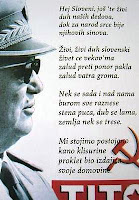"Salam Al-Bey" (Beylical Salute)

"Salam Al-Bey" (Beylical Salute) was the the anthem of Tunisia in use (1846-1957) before independence from France until the overthrow of the bey a year after independence. The author of the music is debatable. Some historians have said it was composed by famed Italian composer Guiseppe Verdi, while others disagree. The anthem was originally wordless, but lyrics (first Arabic, then French) were written by unknown authors.
Giuseppe Fortunino Francesco Verdi (9 October 1813 – 27 January 1901) was an Italian Romantic composer, mainly of opera. He was one of the most influential composers of the 19th century. His works are frequently performed in opera houses throughout the world and, transcending the boundaries of the genre, some of his themes have long since taken root in popular culture - such as "La donna è mobile" from Rigoletto, "Va, pensiero" (The Chorus of the Hebrew Slaves) from Nabucco, "Libiamo ne' lieti calici" (The Drinking Song) from La traviata and the "Grand March" from Aida. Although his work was sometimes criticized for using a generally diatonic rather than a chromatic musical idiom and having a tendency toward melodrama, Verdi’s masterworks dominate the standard repertoire a century and a half after their composition.
Above is a miniature sheet of Verdi, the supposed anthem composer of the Beylical salute issued by St. Tome and Principe in 2001.






